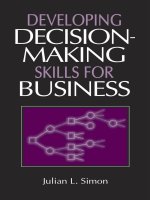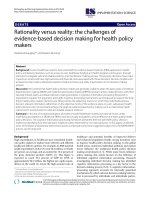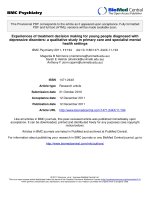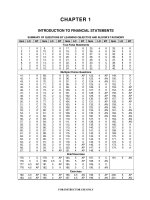Business ethics decision making for per hartman laura 2e
Bạn đang xem bản rút gọn của tài liệu. Xem và tải ngay bản đầy đủ của tài liệu tại đây (6.62 MB, 3,771 trang )
Confi rming Pages
Business Ethics
Decision Making for Personal Integrity and Social
Responsibility
har37136_fm_i-xvi.indd i
har37136_fm_i-xvi.indd i
5/5/10 8:08 AM
5/5/10 8:08 AM
har37136_fm_i-xvi.indd ii
har37136_fm_i-xvi.indd ii
5/5/10 8:08 AM
5/5/10 8:08 AM
Rev. Confi rming Pages
Business Ethics
Decision Making for Personal
Integrity and Social Responsibility
Second Edition
Laura P. Hartman
DePaul University
Joe DesJardins
College of St. Benedict/St. John’s
University
har37136_fm_i-xvi.indd iii
5/26/10 10:32 PM
Confi rming Pages
BUSINESS ETHICS: DECISION MAKING FOR
PERSONAL INTEGRITY AND SOCIAL
RESPONSIBILITY, SECOND EDITION
Published by McGraw-Hill, a business unit of The
McGraw-Hill Companies, Inc., 1221 Avenue of the
Americas, New York, NY 10020. Copyright © 2011 by
The McGraw-Hill Companies, Inc. All rights reserved.
Previous edition © 2008. No part of this publication may
be reproduced or distributed in any form or by any
means, or stored in a database or retrieval system,
without the prior written consent of The McGraw-Hill
Companies, Inc., including, but not limited to, in any
network or other electronic storage or transmission, or
broadcast for distance learning.
Some ancillaries, including electronic and print
components, may not be available to customers outside
the United States.
This book is printed on acid-free paper.
1 2 3 4 5 6 7 8 9 0 DOC/DOC 1 0 9 8 7 6 5 4 3 2 1 0
ISBN: 978-0-07-813713-6
MHID: 0-07-813713-6
Vice President & Editor-in-Chief: Brent Gordon
Vice President EDP/Central Publishing Services:
Kimberly Meriwether David
Publisher: Paul Ducham
Managing Developmental Editor: Laura Hurst Spell
Editorial Coordinator: Jonathan Thornton
Associate Marketing Manager: Jaime Halteman
Project Manager: Erin Melloy
Buyer: Kara Kudronowicz
Design Coordinator: Brenda A. Rolwes
Cover Designer: Studio Montage, St. Louis, Missouri
Senior Photo Research Coordinator: Jeremy Cheshareck
Cover Images: Winding Road: © Imagestage Media
(John Foxx); Fork in the Road: © Chase Jarvis/Getty
Images; Signpost in New York: © Image Source;
Intersecting Railroad Tracks: © Steve Crise/Corbis;
Fork in Desert Road: © Stockbyte/PunchStock;
Commuting: © Ingram Publishing/SuperStock
Media Project Manager: Balaji Sundararaman
Compositor: Laserwords Private Limited
Typeface: 10/12 Times New Roman
Printer: R.R. Donnelley
All credits appearing on page or at the end of the book
are considered to be an extension of the copyright page.
Library of Congress Cataloging-in-Publication Data
Hartman, Laura Pincus.
Business ethics : decision making for personal integrity
and social responsibility/
by Laura P. Hartman and Joseph DesJardins.—2nd ed.
p.
cm.
Includes bibliographical references and index.
ISBN 978-0-07-813713-6 (alk. paper)
1. Business ethics. I. DesJardins, Joseph R. II. Title.
HF5387.H3743 2010
174'.4—dc22
2010011965
www.mhhe.com
har37136_fm_i-xvi.indd iv
har37136_fm_i-xvi.indd iv
5/5/10 8:08 AM
5/5/10 8:08 AM
Confi rming Pages
To Rachel and Emma.
— Laura Hartman
To Michael and Matthew.
— Joe DesJardins
har37136_fm_i-xvi.indd v
har37136_fm_i-xvi.indd v
5/5/10 8:08 AM
5/5/10 8:08 AM
Confi rming Pages
About the Authors
Laura P. Hartman DePaul University
Laura P. Hartman is Vincent de Paul Professor of
Business Ethics and Legal
Studies in DePaul University’s College of Commerce,
serves as Special Assistant
to the President with a focus on DePaul’s Haiti Initiative
and is also Research
Director of DePaul’s Institute for Business and
Professional Ethics. Hartman
represents DePaul University on the steering committee
for Zafen.org , a microfi nance organization seeking to enhance economic
development in Haiti to benefi t
Haitians living in poverty. In her work in the private
sector, she manages external partnerships for Zynga.org , the social initiative
component of Zynga Game
Network. She has been an invited professor at INSEAD
(France), HEC (France)
the Université Paul Cezanne Aix Marseille III, among
other European universities, and previously held the Grainger Chair in Business
Ethics at the University
of Wisconsin–Madison. Her other books include
Rising above Sweatshops:
Innovative Management Approaches to Global Labor
Challenges, Employment
Law for Business, Perspectives in Business Ethics, and
The Legal Environment
of Business: Ethical and Public Policy Contexts.
Hartman graduated from Tufts
University and received her law degree from the
University of Chicago Law
School.
Joe DesJardins College of St. Benedict/St. John’s
University
Joe DesJardins is Associate Provost and Academic
Dean, as well as Professor in the
Department of Philosophy, at the College of St. Benedict
and St. John’s University
in Minnesota. His other books include:
An Introduction to Business Ethics,
Environmental Ethics: An Introduction to
Environmental Philosophy, Environmental Ethics:
Concepts, Policy & Theory (McGraw Hill, 2000);
Contemporary
Issues in Business Ethics, (co-editor with John McCall)
, and Business, Ethics, and the Environment: Imagining
a Sustainable Future. He is the former Executive
Director of the Society for Business Ethics, and has
published and lectured extensively in the areas of
business ethics, environmental ethics, and sustainability.
He
received his B.A. from Southern Connecticut State
University, and his M.A. and
Ph.D. from the University of Notre Dame. He previously
taught for twelve years
at Villanova University.
vi
har37136_fm_i-xvi.indd vi
har37136_fm_i-xvi.indd vi
5/5/10 8:08 AM
5/5/10 8:08 AM
Confi rming Pages
Preface
We began writing the fi rst edition of this textbook in
2006, soon after a wave of
major corporate scandals had shaken the fi nancial
world. Headlines made the companies involved in these ethical scandals household
names: Enron, WorldCom,
Tyco, Adelphia, Health-South, Global Crossing, Arthur
Andersen, ImClone,
KPMG, J.P. Morgan, Merrill Lynch, Morgan Stanley,
Citigroup Salomon Smith
Barney, and even the New York Stock Exchange itself.
At the time, we suggested
that, in light of such signifi cant cases of fi nancial fraud,
mismanagement, criminality and deceit, the relevance of business ethics could
no longer be questioned.
Sadly, the very same issues are as much alive today as
they were several years ago.
Consider the rash of problems associated with the fi
nancial meltdown in 2008–09
and the problems faced by such companies as AIG,
Countrywide, Lehman
Brothers, Merrill-Lynch, Bear Stearns and of the fi
nancier Bernard Madoff. Once
again, we have witnessed fi nancial and ethical
malfeasance of historic proportions and the inability of market mechanisms, internal
governance structures, or
government regulation to prevent it.
As we refl ect upon the ethical corruption and fi nancial
failures of the past
decade, the importance of ethics is all too apparent. The
questions today are less
about whether ethics should be a part of business
strategy and by necessity the
business school curriculum, than about which values and
principles should guide
business decisions and how ethics should be integrated
within business and busi-
ness education.
This textbook provides a comprehensive yet accessible
introduction to the ethical issues arising in business. Students who are
unfamiliar with ethics will fi nd that
they are as unprepared for careers in business as students
who are unfamiliar with
accounting and fi nance. It is fair to say that students will
not be fully prepared,
even within traditional disciplines such as accounting, fi
nance, human resource
management, marketing, and management, unless they are
suffi ciently knowledgeable about the ethical issues that arise specifi cally
within and across those fi elds.
While other solid introductory textbooks are available,
several signifi cant fea-
tures make this book distinctive. We emphasize a
decision-making approach to
ethics and we provide strong pedagogical support for
both teachers and students
throughout the entire book. In addition, we bring both of
these strengths to the
students through a pragmatic discussion of issues with
which they are already
often familiar, thus approaching them through subjects
that have already generated their interest.
New to the Second Edition
Our goal for the second edition remains the same as for
the fi rst: to provide
“a comprehensive yet accessible introduction to the
ethical issues arising in
business.” We have retained the focus on decision
making as well as the emphasis
vii
har37136_fm_i-xvi.indd vii
har37136_fm_i-xvi.indd vii
5/5/10 8:09 AM
5/5/10 8:09 AM
Confi rming Pages
viii Preface
on both personal and policy-level perspectives on ethics.
We continue to provide
pedagogical support throughout the text. The most
noticeable changes involve a
thorough updating of distinct items such as Reality
Checks, Decision Points, and
readings to refl ect new cases, examples, and data.
Among these changes:
• Twenty-fi ve new end-of-chapter readings, averaging
more than two new readings for each chapter;
• New readings offering international and global
perspectives;
• New cases to serve as Chapter Opening Decision
Points;
• New readings on Stakeholder theory;
• Extremely timely and expanded textual coverage of
such topics as corporate
culture, leadership and gender, cultural diversity,
stakeholders, social entrepreneurship, sustainability, the 2009 Genetic Information
Non-Discrimination
Act, sweatshops, living wages, green-washing, corporate
governance, and the
agency problem;
Finally, we have made numerous small editorial changes
in each chapter to make
the text more readable, to clarify concepts, to better
integrate theory and practice,
and to improve end-of-chapter questions to better
support assessment of student
learning, group projects, and classroom discussion.
Why a Decision-Making Model?
Ethics is all about making decisions: What should we
do? How should we act?
What type of life should we live? What type of
organization and society ought we
to create? Who should we be? By providing a decisionmaking model early in this
text and revisiting and reinforcing this model through
Decision Points and discus-
sions of case studies in each chapter, we hope to
accomplish several important
goals.
First, an emphasis on decision making avoids the nagging
challenge of relativism without succumbing to dogmatic preaching. Our
decision-making model
teaches students to think for themselves and to build a
case in support of their
own conclusions, conclusions that are rationally
defensible precisely because they
are the result of a rational decision-making process. In
this way, students become
active learners by taking responsibility for their points of
view.
A decision-making emphasis also offers the promise of
lifelong lessons. Long
after students have forgotten the specifi c content of this
course, the reasoning
skills and habits developed here will continue to infl
uence their everyday personal
and professional lives. The purpose of the text is to
encourage readers to explore
their own values and then to apply a logical process to
reach a well-reasoned conclusion regarding an appropriate course of action. This
process will be relevant no
matter the circumstances, profession involved, or stage
in life as students proceed
beyond the course within which it is taught.
The signifi cance of the decision-making model also
makes this text inherently compatible with diverse and global perspectives in
a way that could not be
har37136_fm_i-xvi.indd viii
har37136_fm_i-xvi.indd viii
5/5/10 8:09 AM
5/5/10 8:09 AM
Confi rming Pages
Preface ix
achieved by a discussion that focused only on specifi c
ethical values and principles. This inclusivity allows the model greater power
of application across borders, subjects, and even time, than a value-based
orientation would allow.
Finally, the decision-making model introduced here is
easily transferred into
other contexts and other courses. Many scholars now
realize that business ethics
should be integrated across the entire range of business
disciplines. The strength
of our decision-making model is that students and
teachers can use it in any business course as a means for addressing ethical issues that
arise in other fi elds. This
is not a text that students will leave on the bookshelves.
This is one that they will
need to consult for each of their courses and, one would
hope, for each of the
issues they might also face in the business environment
outside of the educational
environment as well.
Pedagogical Support
Business ethics creates distinct challenges for both
students and teachers. One
would naturally assume that business ethics requires









